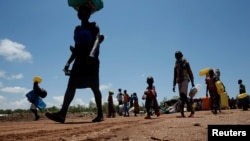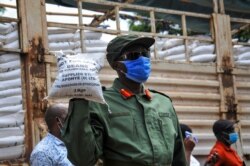The United Nations refugee agency has moved hundreds of South Sudanese refugees in Uganda to a safer location following violence that broke out over accusations of stolen food.
The violence was sparked by an incident July 13, in which youth from the Nuer community allegedly stole maize from the farm of the Kuku community in Palorinya, Obongi district, northern Uganda.
Even though the perpetrators were punished, the situation escalated into violence. Three boys aged 16, 17 and 18 were killed, seven others were wounded, and some 280 shelters were set ablaze.
The U.N. refugee agency, UNHCR, has relocated 762 South Sudanese refugees due to fear of retaliation attacks. Eighty percent of these, according to the UNHCR, are children.
Duniya Khan, the UNHCR Uganda spokesperson, told VOA by phone that even though the tension has diminished, there is still a potential for more violence.
"If 27 percent of the population do not see any hope and they don't have better chances of getting ... secondary schooling education, majority lack higher education and meaningful employment opportunities, then they are very vulnerable to be engaged in ... subversive activities or negative coping mechanisms," Khan said.
In April, the U.N. World Food Program cut food rations in Uganda by 30 percent, which coincided with the coronavirus stay-at-home orders, which in turn affected those struggling to make ends meet, including refugees.
The WFP warned that lack of food could force an already vulnerable group to resort to extreme methods to survive.
Musa Ecweru, Uganda's state minister for refugees, blamed the incidents on South Sudan refugee leaders whom he said keep playing up tribal tensions.
The Ugandan government is now using local radio stations in the community to promote peace.
"Those sentiments continue to run very high among the (South) Sudanese, unfortunately," he said. "So, any small thing can trigger death. This is not the first time. One of the costs that we bear is to look after them and deploy a police force which is trained in human rights to make sure that, apart from just enforcing law and order among these groups, they also are teachers. And teach them how they must live among themselves."
Uganda hosts more than 1.4 million refugees, with South Sudanese nationals making up about two-thirds of the refugee population.
UNHCR Uganda spokesperson Khan warned that the refugees will face further cuts in food rations unless the international community steps up and supplies the necessary funding.





